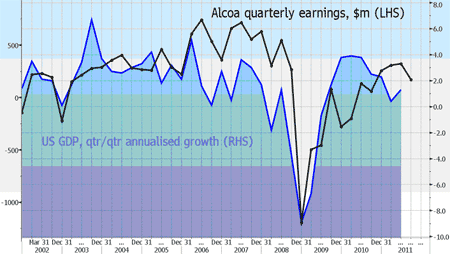What’s new at Alcoa?
A “dramatic” cut in orders from its European customers has just hit US aluminium giant Alcoa. That has caused “a significant reduction” in profits in parts of the business, meaning Alcoa has made much less money in 2011’s third quarter than analysts expected. Earnings for the three months to 30 September came in at 15c a share, compared with forecasts of 22c. It’s a poor start to the new US earnings season.
Why does this matter to UK investors?
Alcoa is the world’s leading aluminium producer. It’s also the biggest global bauxite miner and alumina refiner, with 61,000 employees in 31 countries. It supplies so many industries – aerospace, automotive, packaging, construction, commercial transport and consumer electronics – that it’s a great guide to the health of the global economy.
The stock belongs to the elite 30-strong Dow Jones Industrial Average. And its financial results always kick off the US quarterly reporting season, which gives investors a handy economic bellwether.
How does Alcoa see the outlook?
Alcoa has become less optimistic than it was earlier this year. It declined to give a forecast for its fourth-quarter alumina and primary aluminium output. But the firm is still long-term bullish.
Even “with a slower pace in the second half of the year, we continue to forecast a growth rate of 12% for 2011”, says the board. And “we reaffirm our long-term forecast for a doubling of aluminium demand by 2020. Alcoa is a confident company in a nervous world. We are well prepared for whatever lies ahead, with more cash on hand, lower debt and continued focus on profitable growth”.
What does Alcoa sell?
Flat-rolled sheet, alloy forgings, wheels, fastening systems, precision castings, titanium and nickel-based alloy products. While it does about half its business in America, Europe and Brazil are its largest international markets. It has also been growing fast in China.
What’s the company’s history?
Aluminium was discovered in the early 1800s. It was pricey and rare: in the 1855 Paris Exhibition, small aluminium bars were exhibited next to the French crown jewels. In 1886, chemistry student Charles Martin Hall worked out how to extract aluminium from aluminium oxide and set up a smelting firm. It then expanded into fabrication, raw-material extraction and power generation. In 1907, it became the Aluminum Company of America. As the range of applications grew, so did the business. The name was shortened to Alcoa in 1999.
Who runs Alcoa?
Chairman and chief executive is Klaus Kleinfeld, who worked for Siemens for 20 years. He was paid more than $13m last year. Chief financial officer is Charles (Chuck) McLane Jr, who started with Alcoa in 2000 as investor relations chief.
What the analysts are forecasting
Of the 18 analysts surveyed by Bloomberg, 50% are bulls, 39% rate the stock a ‘hold’, while just 11% are sellers. The average 12-month price target is $13.80, almost 40% above the current level. But this consensus forecast has fallen by 30% in less than three months.
Our view
Alcoa is a good long-term bet. But here’s a word of warning. In July, our advice was “don’t buy it now”, and the shares have since fallen by over 35%. At face value, this makes them more appealing. But analysts have been trimming their earnings forecasts along with the stock price drop, meaning the current year p/e is still around 11.
Further out, look at this chart:

(Source: Bloomberg)
The black line shows Alcoa’s quarterly earnings, while US GDP growth is indicated in blue. The two have broadly moved in lockstep over the last decade.
In other words, the latest drop in Alcoa’s earnings may be triggered by Europe’s woes. But it could well herald another downturn in America’s economy. In turn, if the latter heads back into recession, Alcoa could see its profits fall further. We’d still wait before buying the shares.
Category: Economics

